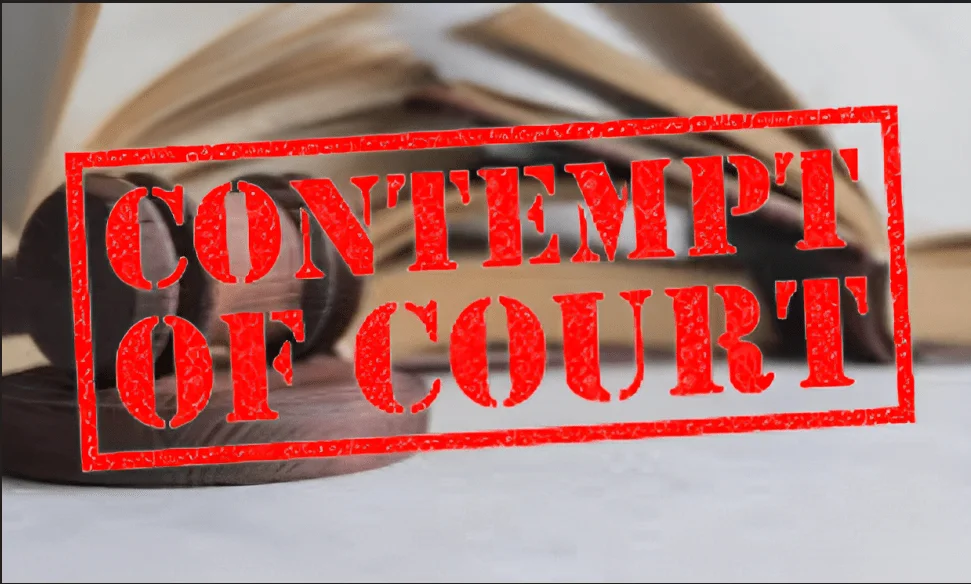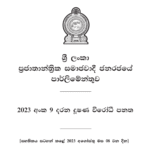1. Introduction
This report provides an in-depth analysis of the case titled SC Contempt No. 09/2024 in the Supreme Court of the Democratic Socialist Republic of Sri Lanka. The case involves an application under Article 105(3) of the Constitution read with Section 8 of the Contempt of Court Act No. 08 of 2024, against the Respondent, Wickramage Don Dharmasiri Karunaratne, an Attorney-at-Law, accused of committing contempt of court.
2. Case Summary
2.1 Background
The case originated from a complaint by the Registrar of the Court of Appeal, alleging that the Respondent applied to peruse the original case record in CA Case No. COC/11/2022 under a false name and subsequently tore two pages from the said record. This act was reported to the Chief Justice, leading to the initiation of disciplinary proceedings under the Judicature Act No. 2 of 1978 and the Supreme Court (Conduct of and Etiquette for Attorneys-at-Law) Rules, 1988.
2.2 Rule Issuance and Suspension
On 27th October 2023, the Respondent was served with notice under SC Rule No. 16/2023, citing breaches of:
- Rule 11 (fraudulent action)
- Rule 60 (disgraceful conduct)
- Rule 61 (conduct unworthy of an Attorney-at-Law)
The Respondent failed to appear on 17th November 2023, prompting the Court to suspend him under Section 42(3) of the Judicature Act pending inquiry.
3. Contempt of Court Allegations
During the inquiry, the Respondent filed an affidavit dated 10th June 2024, containing statements that the Supreme Court deemed derogatory and contemptuous under the Contempt of Court Act No. 08 of 2024. The affidavit alleged that the case was trivial, accused the Court of wasting public resources, and claimed that the suspension was unlawful.
3.1 Relevant Legal Provisions
The charge sheet served on the Respondent referred to:
- Section 3(1)(a): Disrespect to the authority of the Court
- Section 3(1)(b): Prejudice to the judicial process
- Section 3(2)(c): Publishing false statements scandalizing the Court
- Section 3(2)(e): Scandalizing the Court with intent to interfere with justice
4. Case Analysis
4.1 Legal Framework
The case was adjudicated under the provisions of the Contempt of Court Act No. 08 of 2024, the Judicature Act No. 2 of 1978, and the Supreme Court Rules, 1988. These laws outline the ethical and legal obligations of Attorneys-at-Law, as well as the powers of the Supreme Court to uphold the dignity of the judiciary.
4.2 Court’s Justification
The Supreme Court justified its actions by referencing:
- The privileged access of Attorneys-at-Law to court records
- The seriousness of tampering with court documents
- The need to uphold public confidence in the administration of justice
4.3 Procedural Integrity
The Court ensured procedural integrity by serving notices, granting time for legal representation, and hearing submissions from both parties before delivering its judgment.
4.4 Precedents
The Court relied on past rulings such as Re E. A. Vajira Dissanayake and In Re H.A. Mahinda Ratnayake, which emphasize the high standards expected from legal practitioners and the necessity of protecting the judiciary’s authority.
5. Judicial Review
5.1 Fairness of Proceedings
The Supreme Court adhered to procedural fairness by:
- Serving notices through multiple methods
- Allowing the Respondent to file affidavits and make submissions
- Granting time for consultation with legal counsel
5.2 Suspension Authority
Section 42(3) of the Judicature Act permits the Supreme Court to suspend an Attorney-at-Law pending inquiry in exceptional circumstances. The Court justified the suspension based on the gravity of the allegations and the need to protect public confidence in the legal profession.
5.3 Contempt of Court Findings
The Court held that the affidavit filed by the Respondent contained false and scandalous statements intended to undermine the authority of the judiciary, meeting the threshold for contempt under Section 3(1)(a) and Section 3(2)(c) of the Contempt of Court Act.
6. Mitigation and Sentencing
The Court considered the following mitigating factors:
- The Respondent’s expression of remorse
- His advanced age (70 years)
- Absence of proven mental health issues
The Respondent was sentenced to two years rigorous imprisonment, suspended for ten years, and fined Rs. 100,000, with a default sentence of two years simple imprisonment.
7. Conclusion
This case highlights the importance of upholding the dignity of the legal profession and the judiciary. The Supreme Court exercised its contempt jurisdiction to protect the administration of justice, ensuring that attorneys maintain the highest standards of conduct. The judgment balances the need for judicial authority with compassion for the Respondent’s circumstances.
References:
- Constitution of the Democratic Socialist Republic of Sri Lanka
- Contempt of Court Act No. 08 of 2024
- Judicature Act No. 2 of 1978
- Supreme Court (Conduct of and Etiquette for Attorneys-at-Law) Rules, 1988
Read Full Judgement














